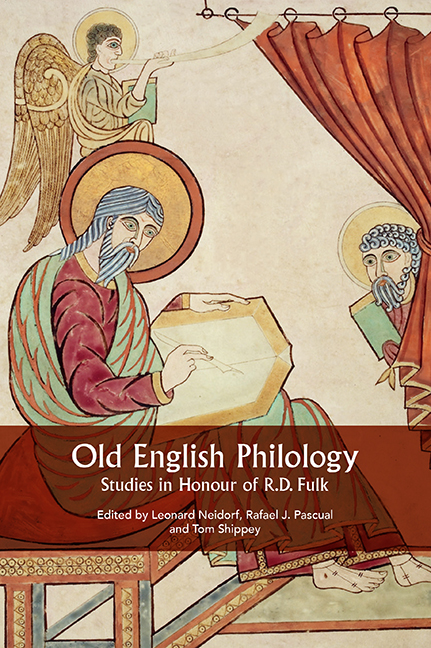Book contents
- Frontmatter
- Contents
- List of Illustrations
- Acknowledgements
- List of Contributors
- Introduction: R.D. Fulk and the Progress of Philology
- 1 Sievers, Bliss, Fulk, and Old English Metrical Theory
- 2 Ictus as Stress or Length: The Effect of Tempo
- 3 Metrical Criteria for the Emendation of Old English Poetic Texts
- 4 The Suppression of the Subjunctive in Beowulf: A Metrical Explanation
- 5 Metrical Complexity and Verse Placement in Beowulf
- 6 Alliterating Finite Verbs and the Origin of Rank in Old English Poetry
- 7 Prosody-Meter Correspondences in Late Old English and Poema Morale
- 8 The Syntax of Old English Poetry and the Dating of Beowulf
- 9 The Anglo-Saxons and Superbia: Finding a Word for it
- 10 Old English gelōme, gelōma, Modern English loom, lame, and Their Kin
- 11 Worm: A Lexical Approach to the Beowulf Manuscript
- 12 Wulfstan, Episcopal Authority, and the Handbook for the Use of a Confessor
- 13 Some Observations on e-caudata in Old English Texts
- 14 The Poetics of Poetic Words in Old English
- 15 Dream of the Rood 9b: A Cross as an Angel?
- 16 The Fate of Lot’s Wife: A ‘Canterbury School’ Gloss in Genesis A
- 17 Metrical Alternation in The Fortunes of Men
- 18 The Originality of Andreas
- 19 The Economy of Beowulf
- 20 Beowulf Studies from Tolkien to Fulk
- The Writings of R.D. Fulk
- Index
- Tabula Gratulatoria
- Anglo-Saxon Studies
Introduction: R.D. Fulk and the Progress of Philology
Published online by Cambridge University Press: 29 May 2021
- Frontmatter
- Contents
- List of Illustrations
- Acknowledgements
- List of Contributors
- Introduction: R.D. Fulk and the Progress of Philology
- 1 Sievers, Bliss, Fulk, and Old English Metrical Theory
- 2 Ictus as Stress or Length: The Effect of Tempo
- 3 Metrical Criteria for the Emendation of Old English Poetic Texts
- 4 The Suppression of the Subjunctive in Beowulf: A Metrical Explanation
- 5 Metrical Complexity and Verse Placement in Beowulf
- 6 Alliterating Finite Verbs and the Origin of Rank in Old English Poetry
- 7 Prosody-Meter Correspondences in Late Old English and Poema Morale
- 8 The Syntax of Old English Poetry and the Dating of Beowulf
- 9 The Anglo-Saxons and Superbia: Finding a Word for it
- 10 Old English gelōme, gelōma, Modern English loom, lame, and Their Kin
- 11 Worm: A Lexical Approach to the Beowulf Manuscript
- 12 Wulfstan, Episcopal Authority, and the Handbook for the Use of a Confessor
- 13 Some Observations on e-caudata in Old English Texts
- 14 The Poetics of Poetic Words in Old English
- 15 Dream of the Rood 9b: A Cross as an Angel?
- 16 The Fate of Lot’s Wife: A ‘Canterbury School’ Gloss in Genesis A
- 17 Metrical Alternation in The Fortunes of Men
- 18 The Originality of Andreas
- 19 The Economy of Beowulf
- 20 Beowulf Studies from Tolkien to Fulk
- The Writings of R.D. Fulk
- Index
- Tabula Gratulatoria
- Anglo-Saxon Studies
Summary
Many festschrifts begin with an introduction that contains personal anecdotes intended to shed light upon the private life and characteristics of the honorand. Were this volume to feature such an introduction, it would be a source of displeasure to our honorand, who has always preferred to let his work speak for itself and has never been comfortable with sentimental praise. The present introduction focuses on the scholarship of Robert D. Fulk not only because the editors believe he would prefer this, but also because there is no other kind of introduction that any of us could have written. One of the editors (Pascual) has never met the honorand in the flesh, while the other two editors have interacted with him in person at only a handful of conferences. Such limited interaction ensures that we are not working under the spell of personal charm or nostalgic affection. What gave impetus to this festschrift, rather, was deep admiration for Fulk's work and a shared conviction that he is the greatest Old English philologist to emerge during the twentieth century. That this conviction is not peculiar to the editors became apparent to us by the tremendous response we received when inviting scholars to contribute to this volume. The ability of this occasion to bring together the top philologists in the profession between the covers of one book is a sign of the respect that our honorand's work commands. Accordingly, one aim of this introduction is to present the rationale behind the widespread admiration that Fulk's scholarship has elicited.
The other aim of this introduction is to indicate how the contents of this volume reflect the themes and concerns that pervade the honorand’s work. One of the most impressive properties of Fulk's corpus is its patent mastery of a multitude of technical disciplines. If the aims of the following essays appear diverse, it is not an accident, but the consequence of honoring a scholar who has contributed to our knowledge of so many different aspects of Old English language and literature.
- Type
- Chapter
- Information
- Old English PhilologyStudies in Honour of R.D. Fulk, pp. 1 - 16Publisher: Boydell & BrewerPrint publication year: 2016

